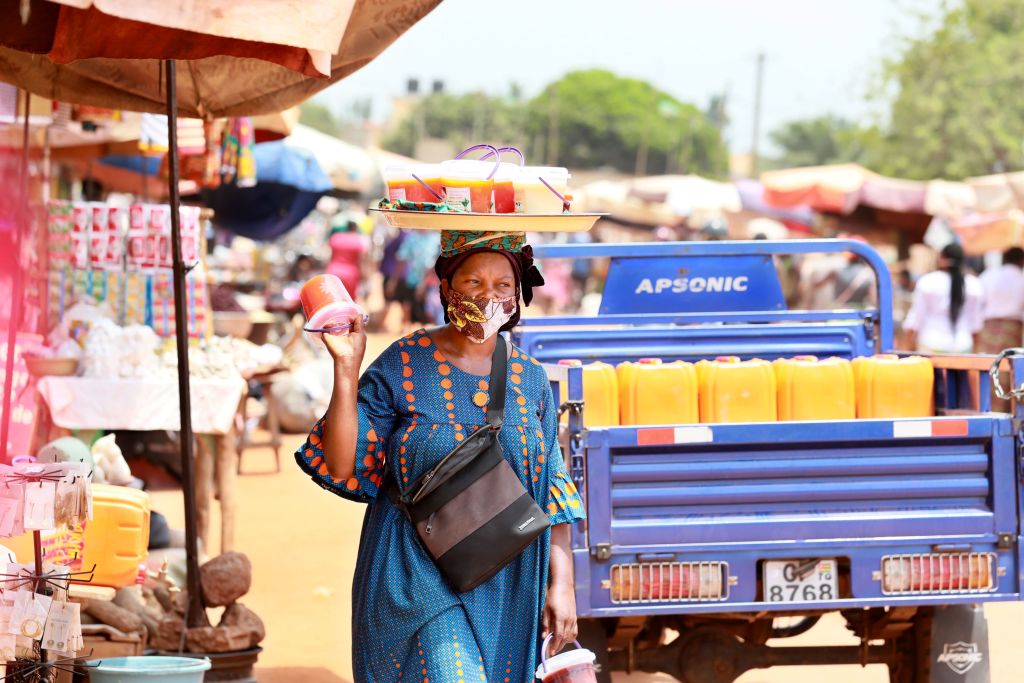Digital Payments Bring COVID-19 Relief to Togo
ADF STAFF
Atani Bamaze was a tutor when the COVID-19 pandemic struck Togo in 2020 and forced schools to close. In a flash he lost his primary source of income and had few resources to take care of his wife and infant daughter.
Weeks later, in another flash that came in the form of a message on his mobile phone, he received a digital stimulus check from the government.
The first of five monthly payments was instantly available on his phone. It wasn’t a windfall, but it was enough to pay rent and feed Bamaze’s family.
“If you don’t have anything and then somebody gives you a little,” he told Bloomberg, “you have to be grateful for the little that you receive.”
COVID-19 pushed more than 100 million people across the globe into extreme poverty.
In Togo, the government designed and launched an all-digital program called Novissi, which means “solidarity” in the regional Ewe language.
At-risk adults such as Bamaze were identified, enrolled in the program and paid without any in-person contact.
Cina Lawson, who leads Togo’s Ministry of Digital Economy and Digital Transformation, came up with the idea.
It took her team less than two weeks to build and implement.
“It’s a strong belief of mine that just because someone is poor doesn’t mean he’s irresponsible — he’s just poor,” she told Bloomberg. “So if you give him money, there’s no way he’s going to waste it. For me, it’s linked with dignity.”
The challenge was steep.
Togo’s last national census, a decade before the pandemic, gathered no information about household wealth or income. In a country where four of five adults work in the informal economy, tax records and payrolls left gaping blind spots.
Using the electoral database, which included about 83% to 98% of Togolese adults, Lawson’s team gathered the addresses and occupations listed by 3.6 million people.
The first round of payments — about $20 a month — went to anyone in the capital, Lomé, who had an informal job.
“You register, the platform determines you’re eligible,” she explained. “Once you enter your voter ID, the platform knows your profession and your geographic position and bam! You receive an SMS with the money.”
Novissi didn’t require an internet connection or a long wait at a government building.
“All they needed was a basic phone,” Lawson said. “[It] took less than two minutes.”
More than 567,000 people received payments in the program’s first round.
It was so successful that a nonprofit called GiveDirectly, whose mission is to address poverty with unconditional cash, helped fund a round of payments to the country’s 200 poorest subdivisions.
Researchers found 138,000 new recipients with artificial intelligence (AI). They developed an algorithm that combed through satellite images to identify people who lived in small homes rather than large ones, thatched roofs rather than more expensive metal roofs and in neighborhoods with dirt roads rather than paved.
A second algorithm used data from mobile phones — the frequency and timing of calls, texts, and data usage — to identify people in need.
With the AI, satellite maps and digital payment system in place, Novissi showed its flexibility and continued to benefit Togolese in need with targeted payments beyond the first year of the pandemic.
When cases spiked in a rural subdivision in August 2021, the ministry sent money to all of the residents there — more than 5,000 people. The government also authorized payments specifically for out-of-work teachers, overworked nurses and intercity bus drivers.
In June 2021, the World Bank approved a $20 million grant for additional emergency relief, most of which Togo has distributed via Novissi.
The program might become permanent.
With an additional $72 million from the World Bank, Lawson is building a database to collect anonymous socioeconomic and biometric data on all citizens.
Several African countries have expressed interest in replicating the program, which also has attracted worldwide interest.
“I can see so many applications of this,” World Bank lead economist Tara Vishwanath told Voice of America. “I think the risks and shocks are becoming commonplace these days.”
In total, Novissi has given 25% of all Togolese adults — 920,000 people — $34 million.
“I don’t need to know your name to know that you need support,” Lawson said. “That’s revolutionary.”


Comments are closed.